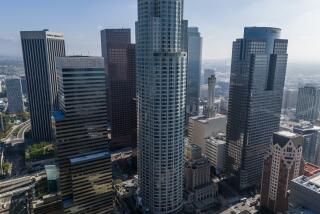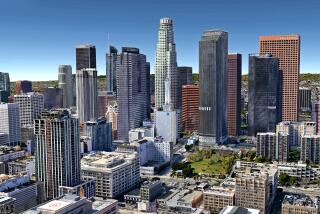New Project Considered for Downtown L.A. : Real Estate Firm May Develop 7-Acre Parcel
Shuwa Investments, the Japanese real estate company which has spent billions of dollars to acquire U.S. property, said Monday that it is studying plans to develop a major downtown commercial project on parcels of land now occupied by Southern California Gas Co.
If Shuwa goes through with its development, it would become the third Japanese company to become a major player in the renewal of downtown Los Angeles. Its move to become a developer marks a change in strategy for Shuwa, best known for purchasing a string of existing, choice U.S. commercial properties, such as the Arco Towers.
Details of Shuwa’s development proposal are sketchy, but the company is putting together a master plan for a 7-acre land parcel that includes the entire block between 8th and 9th streets and Hope and Flower streets, and other surrounding property. The headquarters staff of Southern California Gas is housed in four structures on the block.
Richard de Leon, a Shuwa spokesman, said Johnson, Fain & Pereira, Albert C. Martin & Associates and Urban Innovations Group have each been asked to develop bids and design plans for a mixed-use project that would involve office and retail space and housing.
“They have informed us they are in the process of developing a master plan,” said Donald Spivack, director of operations at the city’s Community Redevelopment Agency, which is overseeing the city’s urban renewal effort in the area. But he added, “They certainly have not come to us with a particular proposal.”
Downtown Boom
He said that Michael Hicks of Shuwa’s architectural department, and Kelvin Nishikawa, Shuwa’s project manager, have been in touch with the CRA.
At least two other Japanese real estate companies have started downtown projects. Mitsui Fudosan (U.S.A.), with partner Gerald D. Hines Interests of Houston, recently broke ground for a $200-million, 52-story office project at Wilshire Boulevard and Figueroa Street. Mitsubishi Estate New York has formed a partnership with Ayrshire Corp. of Houston to build the second of three office towers at Citicorp Plaza.
“The Japanese are, in fact, a major force in the development of downtown,” said Jack Barthell, managing partner of Kenneth Leventhal & Co., a real estate consulting firm in Century City.
Shuwa has been accumulating the parcel over the past year. It purchased the block last year from Southern California Gas and its parent, Pacific Enterprises, formerly Pacific Lighting, for $76.6 million. Southern California Gas agreed to lease back space until it moves to 5th Street and Grand Avenue in 1991.
In September, Shuwa paid an undisclosed amount to buy a parking structure on Flower Street, north of 9th Street, from Pacific Enterprises. A Pacific Enterprises spokesman said it expects to complete an agreement to sell Shuwa another parking lot on Grand Avenue, north of 9th Street, by the end of the year.
Real estate insiders say the properties Shuwa has been accumulating are strategically located between the downtown business district on one end and the South Park residential area near the Convention Center at the other end. Before selling the properties, Pacific Enterprises had worked up some preliminary plans to develop two 40-story office buildings and a hotel. That plan was made available to Shuwa for review.
Firm Keeps Low Profile
Shuwa’s plans are said to involve an 84-story skyscraper, which would become the tallest building in the city, according to the Los Angeles Business Journal. However, Spivak at the CRA said a building of that is “extremely hypothetical and highly unlikely” because it is not practical and realistic to put one building on seven acres of land.
Shuwa has kept a low profile since it made headlines across the country in 1986 when it made a series of multimillion-dollar purchases of prime real estate across the country. It turned to commercial real estate after dabbling in development of small industrial parks and some residential properties.
The move back into property development indicates a scarity in trophy-type buildings, according to Barthell.
More to Read
Sign up for Essential California
The most important California stories and recommendations in your inbox every morning.
You may occasionally receive promotional content from the Los Angeles Times.






